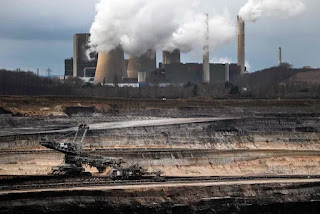 |
Germany announced on Thursday that it would spend $44.5 billion to quit coal — but not for another 18 years, by 2038.
The
move shows how expensive it is to stop burning the world’s dirtiest
fossil fuel, despite a broad consensus that keeping coal in the ground
is vital to averting a climate crisis, and how politically complicated it is.
Coal, when burned, produces huge amounts of the greenhouse gas emissions that are responsible for global warming.
Germany
doesn’t have shale gas, as the United States does, which
has led to the
rapid decline of coal use in America, despite President Trump’s support
for coal. Germany also faces intense opposition to nuclear power. After
the Fukushima disaster
in 2011, that opposition prompted the government to start shutting down
the country’s nuclear plants, a transition that should be complete by
2022.
 |
| Resistance to the Adani Coal Mine in Australia |
The
money announced Thursday is to be spent on compensating workers,
companies and the four coal producing states — three in the country’s
east and one in the west. It followed months of negotiations between
regional officials and Chancellor Angela Merkel’s government.
Germany’s timetable, though, could present challenges to the European Union’s efforts to swiftly cut its greenhouse gas emissions, as the bloc’s new leadership has announced. Countries around the world are watching how quickly the 28-country union, which, taken together is currently the third-largest emitter of planet-warming gases, can reduce its carbon footprint. Germany is the largest economy in the European Union.
Go to NYT article
No comments:
Post a Comment